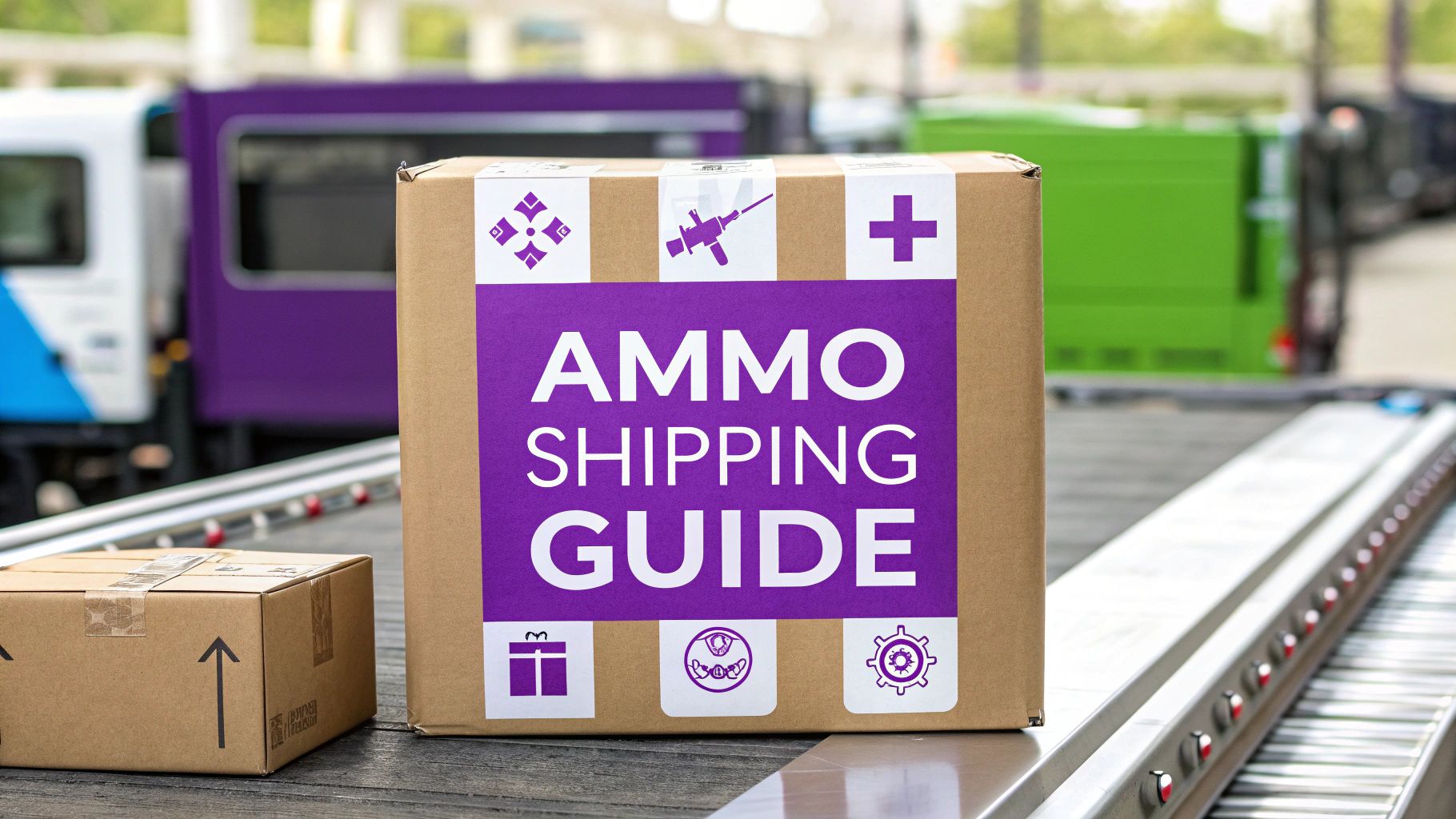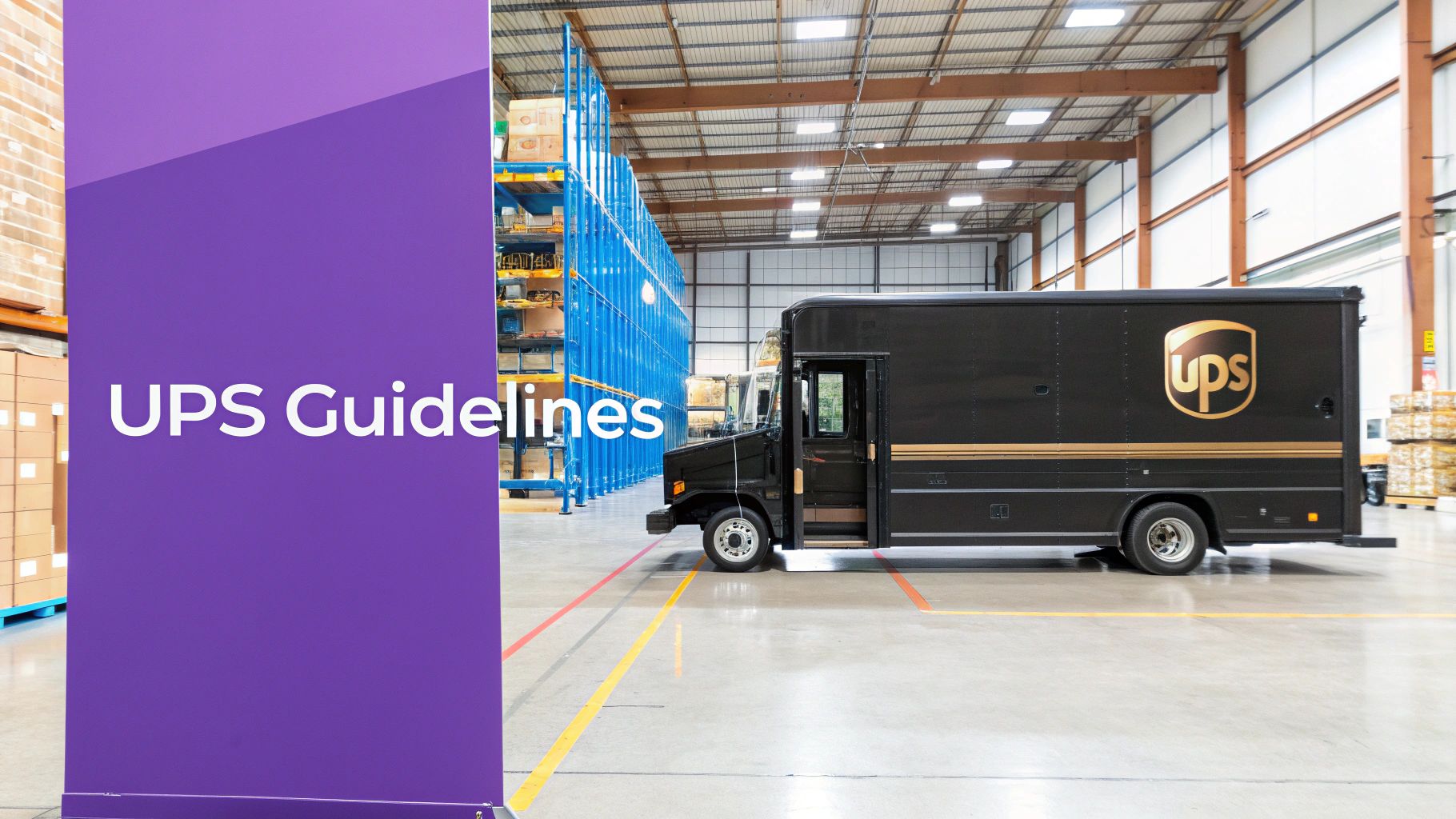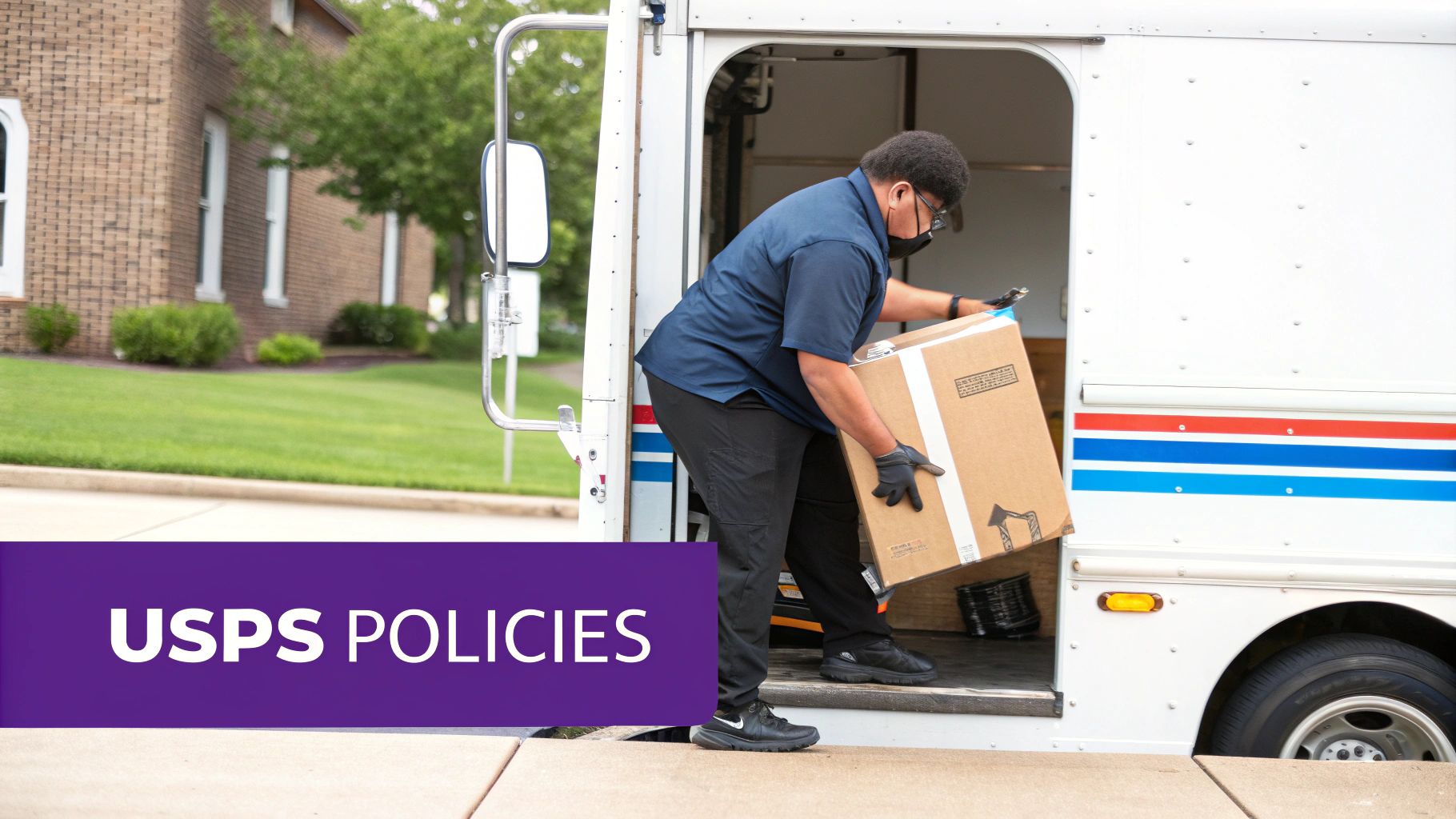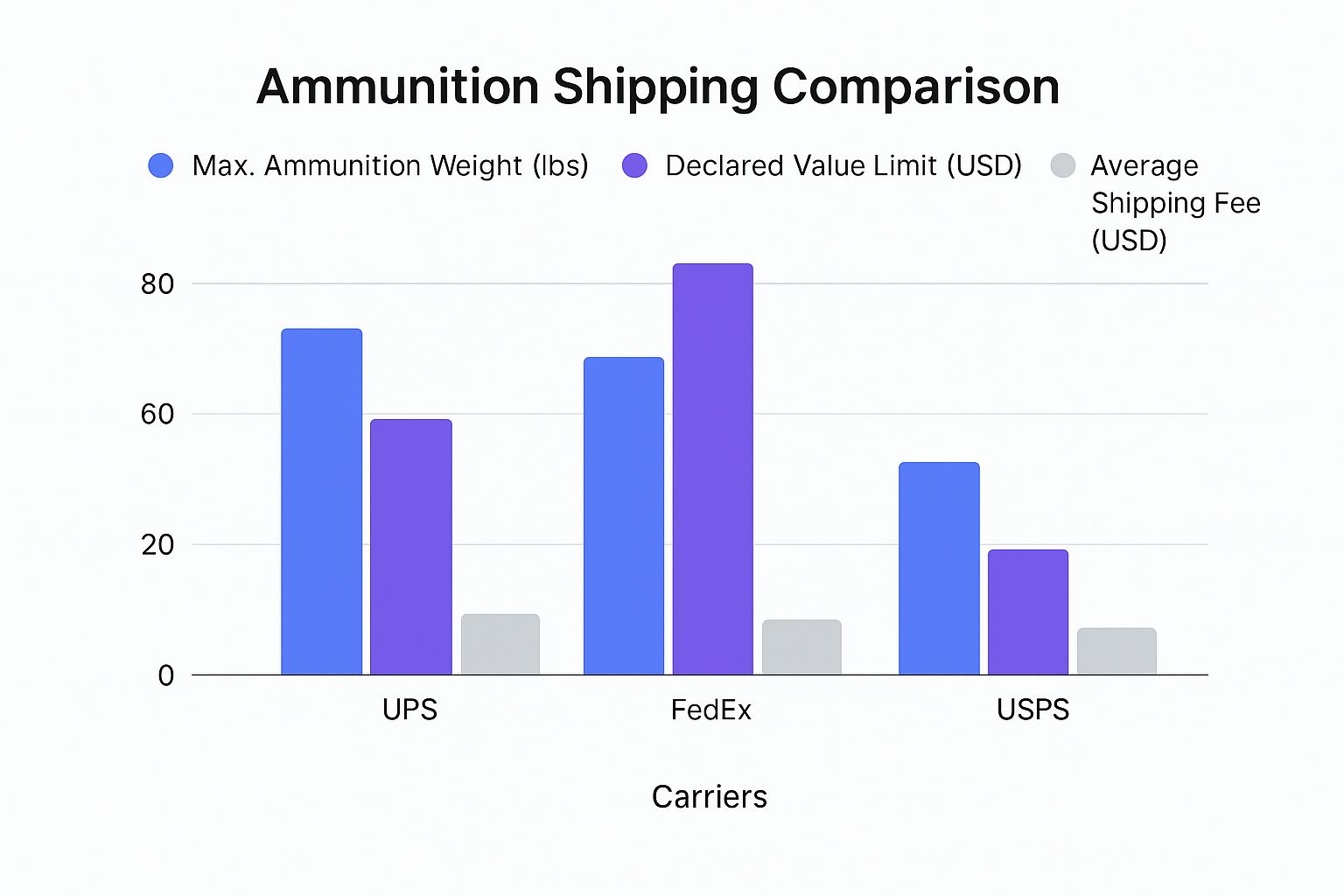
UPS vs FedEx vs USPS: Which Carriers Allow Ammunition Shipping?
Discover which carriers—UPS, FedEx, or USPS—allow ammunition shipping, their specific rules, and how to ship legally. Learn more now!
Cody Y.
Updated on Sep 20, 2025
When it comes to shipping ammunition, a lot of people are surprised to learn that their options are pretty limited. The bottom line is this: UPS and FedEx will both handle ammunition if you follow their strict rules, but the USPS wants nothing to do with it.
So, your real choice boils down to UPS versus FedEx, and that decision will hinge on things like their specific service options, packaging requirements, and whether you need a special contract.
Your Quick Guide to Shipping Ammunition
Figuring out which carriers will even accept ammunition is the first—and most critical—step for any FFL or individual shipper. These rules aren't just suggestions; they are non-negotiable policies designed to keep everyone safe and on the right side of the law. One mistake can lead to a refused package, a suspended shipping account, or even legal trouble.
This guide is designed to cut through the confusion. We’ll focus on the only two viable options, UPS and FedEx, and explain exactly why your local post office is off-limits for ammo shipments.

Carrier Ammunition Shipping Policy At a Glance
To give you a bird's-eye view, the table below breaks down the high-level policies for each major carrier. It’s a quick way to see who’s in the game and what major restrictions to keep in mind.
| Carrier | Allows Public and Commercial Shipping | Primary Service Options | Key Restriction Highlight |
|---|---|---|---|
| UPS | Yes | UPS Ground | No shipping from The UPS Store or drop boxes; must use a UPS Customer Center. |
| FedEx | Yes | FedEx Ground, FedEx Express | Requires pre-approval and a formal contract to ship; no shipping from FedEx Office locations. |
| USPS | No | None | Strictly prohibited for both private and commercial shippers, with extremely narrow exceptions. |
This table makes the landscape pretty clear. While both UPS and FedEx are options, they each have unique hoops you’ll need to jump through.
Why USPS Is Not an Option
Let's get this one out of the way first: The United States Postal Service (USPS) has a blanket prohibition on shipping ammunition for consumers and businesses. It's just not something they do.
While there are some incredibly narrow exceptions for official government agencies, for all practical purposes, USPS is a dead end for your ammunition shipping needs. This policy is set in stone and is a foundational piece of knowledge for planning your logistics.
Key Takeaway: Never, ever try to ship ammunition through USPS. You’d be violating their service agreement and federal law, which can lead to some serious consequences. Stick with a compliant private carrier like UPS or FedEx.
For eCommerce businesses, especially those running on WooCommerce, managing these carrier-specific rules is absolutely vital. You have to configure your store to offer the right shipping options at checkout, or you'll be dealing with canceled orders and angry customers. To get this right, you can learn more about firearms and ammunition shipping compliance for WooCommerce stores in our in-depth guide.
How to Ship Ammunition with UPS
When you're weighing your options between UPS, FedEx, and USPS, UPS is a solid, reliable choice for shipping ammunition. But there’s a catch: you have to follow their rulebook to the letter. Their process is built entirely around safety and compliance, so you can't just toss a box on the counter and call it a day.
UPS treats ammunition shipments with a much higher level of scrutiny than your average package. This isn't something you can drop off at just any location. The carrier has a strict set of rules that everyone—from individuals to large businesses—must follow.

Core UPS Ammunition Shipping Requirements
First things first: all ammunition must ship via UPS Ground. No exceptions. Because ammunition is classified as a hazardous material (an explosive, according to DOT regulations), it's strictly forbidden on any aircraft. This ground-only policy is their primary way of minimizing risk.
On top of that, UPS has some key restrictions you need to know.
- You can only tender ammunition shipments at an official UPS Customer Center or through a scheduled pickup account. This is a big one. It means no drop boxes, no The UPS Store locations, and no third-party retail partners.
- There are limits on the ammo itself. It cannot exceed 12.7 mm (.50 caliber) for rifle or pistol cartridges or 8 gauge for shotgun shells.
- The total package weight must stay under 66 pounds.
These rules are in place for a good reason. They ensure only trained UPS employees handle these packages right from the start. You can dig into more of the specifics on these shipping regulations on freightrun.com.
Proper Packaging and Labeling
Getting the packaging right is non-negotiable. UPS demands that ammunition be packed securely in new, sturdy corrugated boxes. The cartridges can't just be loose inside; they need to be in their original retail packaging or tucked into fiberboard inner boxes or partitions to stop them from rattling around.
Here’s a quick rundown for proper packaging:
- Start with a new, strong outer box. It needs to be in perfect condition to handle the weight without failing.
- Secure the contents. Use the original manufacturer's box or internal partitions to keep cartridges locked in place.
- Add cushioning. Fill every bit of empty space with packing material. If you can shake the box and hear movement, you need more.
- Never mix firearms and ammunition. They must always be shipped in separate packages.
Crucial Insight: The outside of the box must not have any markings that scream "ammunition." However, it is required to have the proper DOT-approved “Limited Quantity” mark. This diamond-shaped label signals to handlers that it contains regulated materials without advertising the specific contents to the public.
Drop-Off and Pickup Procedures
As we touched on earlier, where you hand off your package makes all the difference. You have just two options for getting an ammunition shipment into the UPS system.
- UPS Customer Center: You have to bring your correctly packaged and labeled shipment directly to an official, full-service UPS Customer Center. These are not the same as The UPS Store franchises, so be sure you know the difference.
- Scheduled Daily Pickup: If you run a business with a UPS account that includes scheduled daily pickups, your driver can accept your ammunition shipments. This is the go-to solution for companies that ship regularly.
Trying to use a drop box or a third-party retail shop will get your package refused on the spot. This strict chain of custody is a fundamental part of their safety protocol, ensuring every ammo shipment is documented and handled by authorized personnel from the moment it leaves your hands. If you follow these procedures, you can ship with UPS confidently.
Navigating FedEx Ammunition Shipping Rules
While UPS has a well-defined process for shipping ammo, FedEx brings its own distinct framework to the table. Many businesses prefer FedEx, drawn by its flexible service options and reputation for security. At its core, the FedEx approach is built on strict legal compliance and a mandatory pre-approval process, ensuring that only vetted and authorized parties are shipping regulated goods through their network.
This all starts before you even think about taping up a box. Unlike UPS, where an individual can technically walk into a Customer Center with a compliant package, FedEx requires shippers to have a formal agreement in place first. It’s a pre-approval system where FedEx vets your business and establishes a contract specifically for shipping regulated items, including ammunition.

FedEx Service and Authorization Requirements
One of the biggest differentiators with FedEx is that they allow ammunition shipments via both FedEx Ground and FedEx Express. This flexibility is a huge plus for shippers who need to get orders delivered faster. For instance, since handguns are required to ship via an Express service, you can often send ammunition along with them using the same service level. This creates a much smoother workflow for FFLs shipping multiple product types.
But you can't just start using these services. Access is granted only after a detailed vetting process that focuses on legal compliance, safety, and thorough documentation. Both the sender and the recipient typically have to be authorized parties, such as licensed importers, manufacturers, dealers, or collectors recognized under federal and state laws. You can find more details on this in FedEx's guidelines featured on ShipScience.com.
Documentation and Packaging Protocols
FedEx is extremely particular about paperwork. Shippers have to complete a Firearms Shipping Record for every single shipment, a document that serves as a certification of the contents' legality and compliance. Any mistake or omission on this form can lead to an immediate refusal to ship.
The packaging rules are just as strict and line up with industry best practices:
- Outer Box: Your package must be in a new, sturdy, unmarked corrugated box. No logos or markings related to firearms or ammunition are allowed on the outside.
- Inner Packaging: Ammunition needs to be secured inside, either in its original retail packaging or separated by fiberboard partitions to stop it from shifting around.
- Labeling: The package must have the proper DOT Limited Quantity mark displayed on the outside. This label alerts handlers to the contents without spelling out exactly what's inside.
Key Insight: That pre-approval and formal contract requirement means FedEx is a better fit for established businesses and licensed dealers, not so much for an individual making a one-off shipment. Their entire system is geared toward vetted, regular shippers.
Drop-Off and Security Measures
Just like UPS, FedEx is very specific about where you can hand over your ammunition shipments. You absolutely cannot use an unstaffed drop box or a retail location like a FedEx Office store. All shipments have to be given directly to FedEx personnel, either through a scheduled pickup at your licensed business or by dropping them off at a staffed, authorized FedEx Ship Center.
This controlled hand-off is all about security and accountability. FedEx’s tracking systems, especially on their Express services, give you detailed, real-time updates that provide a lot more peace of mind for high-value or time-sensitive shipments. It's this combination of pre-approval, service flexibility, and solid tracking that makes FedEx a go-to choice for businesses that put a premium on speed and security.
Comparing UPS and FedEx Ammunition Policies
Deciding between UPS and FedEx for shipping ammunition isn't just about comparing rates. The real difference lies in their policies, service options, and how accessible they are for different types of shippers. The best choice really boils down to your specific needs, whether you're an individual sending a single box or a high-volume FFL dealer running an e-commerce store.
When you put them side-by-side, some key operational differences pop up immediately. UPS generally offers a more direct path for individuals, while FedEx has built its services around pre-approved, commercial relationships. Grasping this distinction is the first step in figuring out which carrier fits your shipping model.
This breakdown highlights the most important data points—like maximum weight, declared value, and average fees—across the carriers that will actually take your ammo.

As you can see, while the weight limits are pretty close, the costs and value protection can swing wildly. This is something to keep in mind, especially for bulk orders or high-value specialty ammunition.
Service Flexibility: Ground vs. Express
One of the biggest differentiators is shipping speed. UPS keeps it simple: all ammunition shipments must go via UPS Ground. There are no exceptions and no options for faster service. It's a straightforward, unambiguous rule that works just fine for anyone prioritizing cost over speed.
FedEx, on the other hand, gives you more room to maneuver. It allows ammunition shipments via both FedEx Ground and FedEx Express services. This is a huge plus for businesses that need to coordinate ammunition deliveries with firearm shipments (which often require expedited shipping) or for customers who simply want their order faster.
Drop-Off and Accessibility
How you actually get the package into the carrier's hands is another critical point. Both companies are firm about one thing: you can't use unstaffed drop boxes or third-party retail spots like The UPS Store or FedEx Office.
- UPS: You're required to bring your package to an official UPS Customer Center or arrange for a scheduled pickup with an account. The key here is that individuals can walk in and do this without a formal contract.
- FedEx: Mandates that all ammo shipments are handed over via a scheduled pickup or dropped off at a staffed FedEx Ship Center. The catch? This is only for pre-approved account holders.
Key Differentiator: The entire system hinges on pre-approval. UPS allows compliant individuals to use their main hubs for walk-in service. FedEx’s system, by contrast, is built for businesses with an established, vetted shipping agreement. This makes UPS the far more practical choice for one-off personal shipments.
Documentation and Contracts
The paperwork and contractual red tape also look quite different. With UPS, you can ship common small arms cartridges without a special contract, as long as you follow every single packaging and labeling rule.
FedEx requires all ammunition shippers to be pre-approved and have a formal contract signed and sealed. This process involves a deep dive into your business and licensing to ensure you meet their compliance standards. For FFLs managing online stores, getting these details right is vital for smooth operations. If you need a hand with the tech side, our guide on FFL dealer shipping restrictions for WooCommerce can help automate the compliance part.
At the end of the day, UPS is often the go-to for occasional shippers because of its accessibility. FedEx, however, offers superior flexibility and service options for established businesses with consistent shipping volume.
Detailed Feature Comparison for Shipping Ammunition
To make the decision clearer, let's break down the policies head-to-head. This table digs into the specific requirements and service features that will likely influence your choice.
| Feature | UPS Policy | FedEx Policy | Deciding Factor |
|---|---|---|---|
| Contract Required | No, for common small arms cartridges. | Yes, a formal, pre-approved shipping agreement is mandatory. | Accessibility. UPS is open to individuals, while FedEx is for established business accounts. |
| Service Options | Ground Only. No expedited options are available. | Ground and Express. Offers flexibility for faster delivery needs. | Speed. FedEx is the only option if you need to ship ammunition faster than standard ground. |
| Drop-Off Location | Official UPS Customer Centers or scheduled pickup. | Staffed FedEx Ship Centers or scheduled pickup (account holders only). | Convenience. UPS allows walk-ins for anyone, whereas FedEx requires an approved account for any drop-off. |
| Individual Shipping | Allowed, provided all labeling and packaging rules are followed. | Not Allowed, requires a pre-approved commercial account. | Shipper Type. UPS is the practical choice for non-business, personal shipments. |
| Declared Value Limit | Up to $50,000 with proper documentation. | Up to $50,000 with a specific declared value agreement. | Value. Both offer high-value protection, but the process may differ based on your contract. |
| Labeling Rules | Requires the ORM-D "Cartridges, Small Arms" mark. | Requires a "Limited Quantity" diamond mark. | Compliance Detail. A minor but important difference in required markings for hazardous materials. |
This granular view shows that while both are viable carriers, their operational models cater to very different shippers. Your choice will depend less on cost and more on whether you're a business with a contract or an individual needing to make a one-time shipment.
Understanding State and Federal Shipping Laws
<iframe width="100%" style="aspect-ratio: 16 / 9;" src="https://www.youtube.com/embed/rDB9wbvr9uU" frameborder="0" allow="autoplay; encrypted-media" allowfullscreen></iframe>Just knowing carrier policies is only half the battle. Every single package you ship must also comply with a complex web of state and federal laws. Getting this wrong can lead to serious legal trouble—far worse than just a rejected shipment.
And this legal landscape isn't static. It changes constantly, which means you have to stay diligent to keep your business safe.
At the federal level, agencies like the Bureau of Alcohol, Tobacco, Firearms and Explosives (ATF) and the Department of Transportation (DOT) set the baseline rules. It's the DOT, for instance, that classifies ammunition as a hazardous material. That classification is precisely why it needs specific labeling, like the "Limited Quantity" mark, and must travel by ground.
State-Level Compliance Is Non-Negotiable
Beyond federal rules, individual states create a patchwork of regulations that can be a real headache to track. As the shipper, you carry 100% of the responsibility for knowing and following the laws of the destination state. You can never assume that a shipment that's legal in your state is also legal where it's headed.
Several jurisdictions have notoriously strict controls:
- California often requires ammunition to be sent directly to a licensed vendor for pickup by the customer.
- New York and Illinois have very specific licensing and ID verification requirements for anyone buying ammunition.
- Other states might have outright bans on certain types of ammo.
This means you absolutely must verify the recipient's eligibility, confirm they meet age requirements (18+ for rifle/shotgun ammo, 21+ for handgun ammo), and ensure the delivery address isn't in a restricted zone before you even think about printing a label. If you're curious about how these kinds of rules are drafted in the first place, looking into the general principles of policy writing can offer some interesting context.
Important Disclaimer: This information is for educational purposes only and does not constitute legal advice. You should always consult with a qualified legal professional to ensure your shipping practices are fully compliant with all applicable laws.
Staying current with these constantly shifting rules is non-negotiable. For any FFL, claiming ignorance of a new city ordinance or an updated state law simply isn't a valid defense. Trying to handle this with manual checks is just asking for trouble, which is why automating compliance is so crucial.
You can learn more about navigating these complexities in our guide to shipping firearms across state lines. By doing your due diligence, you can minimize legal risk and make sure every shipment is compliant from start to finish.
Your Ammunition Shipping Questions, Answered
Let's cut through the confusion. Shipping ammunition brings up a lot of questions, especially when you're trying to figure out which carrier—UPS, FedEx, or USPS—is the right choice. Here are straightforward answers to the most common questions we hear from sellers.
Can I Ship Ammunition to Any State?
Absolutely not. This is one of the most dangerous assumptions you can make. Federal law sets a baseline, but from there, individual states and even cities can layer on their own, much stricter rules. It's a classic mistake to think that because a shipment is legal in your state, it's good to go everywhere else.
States like California, New York, New Jersey, and Illinois are notorious for their complex requirements. You'll run into rules like:
- Mandating that ammunition must be shipped directly to a licensed dealer (FFL).
- Requiring the recipient to provide special permits or identification.
- Banning certain types of ammunition entirely.
As the shipper, the legal burden is 100% on you to know and follow the laws at the destination before you even think about printing a label.
Do I Need an FFL to Ship Ammunition?
It depends on who you are. If you're an individual shipping your own ammo for personal use, you generally don't need a Federal Firearms License (FFL). But for anyone selling ammunition commercially, the game changes—you must be properly licensed to be in business.
Carrier policies add another layer of complexity here. UPS is typically more open to handling personal, individual shipments. FedEx, on the other hand, structures its policies around formal agreements with licensed, pre-approved businesses. You always have to check the carrier's rules on top of all state and federal laws.
What Happens If I Mail Ammunition Through USPS?
Don't do it. Trying to ship ammunition through USPS as a private citizen is a huge mistake that violates their regulations and federal law. It is strictly and completely prohibited.
USPS actively screens packages for prohibited items. If they find ammunition in your box, it will be seized. Even worse, you, the sender, could face serious legal trouble, including heavy fines and potential criminal charges. It is an unsafe, illegal option with zero exceptions for the public.
How Should I Package Ammunition for Shipment?
Proper packaging isn't a suggestion; it's a non-negotiable safety requirement for both UPS and FedEx. The two guiding principles are containment and discretion.
Ammunition has to be secured in its original retail box or packed tightly in fiberboard partitions to stop any movement. That inner container then goes inside a new, strong, unmarked corrugated box. Use filler like bubble wrap or packing paper to fill any voids and make sure the contents are snug.
The outer box must not have any branding, logos, or text that hints at its contents. However, it must display the required DOT-approved Limited Quantity mark.
Trying to keep track of these rules manually is a recipe for disaster for any e-commerce business. Ship Restrict takes the guesswork out of compliance. It lets you build granular shipping rules by state, city, county, or ZIP code right inside WooCommerce. You can stop worrying about expensive mistakes and be confident that every order is compliant before it leaves your warehouse. Learn more at https://shiprestrict.com.

Cody Yurk
Founder and Lead Developer of ShipRestrict, helping e-commerce businesses navigate complex shipping regulations for regulated products. Ecommerce store owner turned developer.